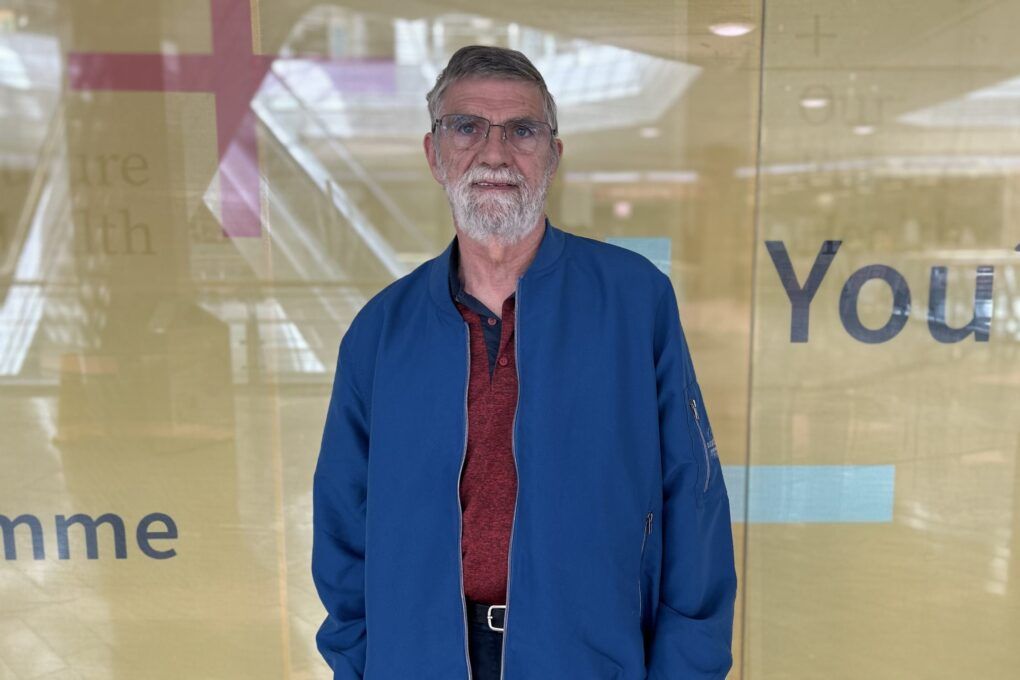‘After suffering a stroke, I joined Our Future Health to give back to the NHS’

30 August 2017. The date is forever etched in the memory of Graham Knight, an Our Future Health volunteer. Until that point, at 65, he’d lived his life largely without illness and assumed he was relatively healthy.
“Before then, I knew nothing about stroke,” he says. “It didn’t register on my radar.”
That morning, when his wife brought him a cup of tea in bed, pins and needles shot down Graham’s left arm. He struggled to raise it to lift the cup.
“You often get pins and needles after sleeping on your arm, but this time they didn’t go,” he says. “Then I got out of bed and stumbled. My wife asked if I was OK, and I said, ‘No – you better call an ambulance.’”
Luckily, Graham’s rapid response meant that he got to hospital quickly, where tests revealed he’d suffered an ischaemic stroke – specifically a right corona radiata infarct, also known as a small lacunar stroke. It’s an ischaemic stroke, which is the result of one of the small arteries in the brain becoming blocked with a clot, stopping oxygen getting to the brain. This is as opposed to the other major type of stroke, a haemorrhagic stroke, which is caused when a blood vessel bursts or leaks.
Ischaemic strokes are the most common type of stroke in the UK, and 30% of those who suffer lacunar stroke are left dependent on others for care. “They took an MRI scan of my brain, and you could see a tiny patch, about as big as my fingernail, that was dead,” Graham says.
As is often the case with stroke, the exact cause was never pinpointed.
Certain factors increase the risk of stroke, including smoking, high alcohol intake, obesity, diabetes, high cholesterol and high blood pressure, as they contribute towards fatty build-up in the arteries. “I didn’t have any health issues,” Graham says. “I gave up drinking when I was 40, but I smoked all my life – originally cigarettes before moving onto 10 miniature cigars a day – until I had the stroke.”
A family history of stroke also means you may be more at risk, although in Graham’s case neither of his parents had suffered the disease.
Know the signs
According to statistics from the Stroke Association UK, 100,000 people in the UK suffer stroke each year – that’s one every five minutes. The disease is more likely to occur in those aged over 55, although 1 in 4 strokes affect younger people. Around 35,000 people die from stroke in the UK every year.
Stroke can vary in its types and effects, but knowing the signs of stroke is crucial to reducing the effects – the FAST test helps you understand the symptoms to look for.
For Graham, who lives in Bristol, the stroke was a wake-up call. “It made me realise I wasn’t as fit as I thought I was, so I gave up smoking straight away.” Now aged 71, he eats a much healthier diet, cooking meals with fresh vegetables, fish and meat rather than consuming frozen meals, and walks regularly, including a six-kilometre walk twice a week. “I feel as healthy as the proverbial butcher’s dog,” he says.
The stroke led to another revelation for Graham – that he wanted to help others by taking part in health research. “When I was offered the opportunity to take part in Our Future Health by joining at the Bristol clinic, I thought it was a worthwhile thing to do.”
Our Future Health hopes to improve stroke healthcare by increasing our ability to prevent the disease. Although a stroke happens suddenly, it is normally the result of a long health journey, in which someone’s arteries clog over time. Researchers will use Our Future Health to discover more effective ways to identify people who are at high risk so that doctors can intervene earlier, before a clogging artery becomes blocked or bursts.
An emotional experience
In terms of recovering from stroke, everyone’s experience is different. Graham remained in hospital for three days. He was put on blood-thinning medication and had eight weeks of physiotherapy to try to regain movement in his arm.
Long-term, his fine-motor skills in his left hand are not quite what they were before the stroke. The other major unexpected impact, though, was on his emotional response. He now cries much more easily than prior to the stroke.
“Often, I burst into tears when I’m speaking to somebody, which can be embarrassing for the other person if they don’t know me,” he says. Anything can set him off: a sad or happy film, or even talking about the stroke. Although doctors don’t know the cause of this after-effect, Graham believes that the section of his brain that was affected by the stroke was the part that’s responsible for emotions.
By joining Our Future Health, Graham hopes that he can give something back to the NHS that looked after him during his hospital stay and his recovery. “My care was brilliant – in the hospital as well as afterwards via the NHS physiotherapists, who visited me regularly at home.
“By taking part in this research, I’m hoping to add to a body of knowledge that will help many people in the future. After all, you never know when you might need assistance, so anything you can do to help others will be reciprocated with help to you.”
For more information on stroke, visit stroke.org.uk. Stroke Association is an affiliate charity of Our Future Health

Let’s prevent disease together
By volunteering for Our Future Health, you can help health researchers discover new ways to prevent, detect and treat common conditions such as diabetes, cancer, heart disease, stroke and Alzheimer’s.